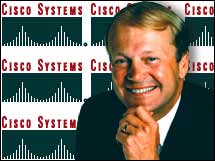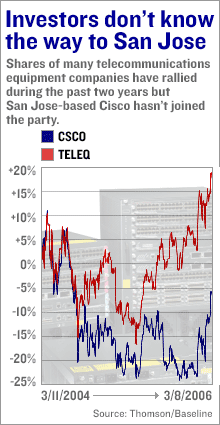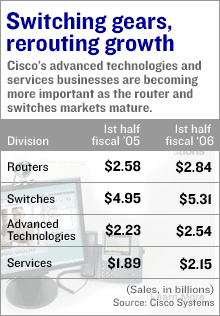|
Can Cisco rediscover its 'growthiness?'
Stock Spotlight: The No. 1 maker of Internet gear has matured. Can investments in new markets revitalize its stock?
NEW YORK (CNNMoney.com) - Like fans of "The Sopranos," Cisco investors have waited a long time for their faith to be rewarded. Shares of Cisco (Research), the biggest manufacturer of Internet gear, were stuck in a rut the past two years while the stocks of other equipment makers rallied. The company , which thrived during the Internet boom of the late 1990s, has been dogged by the problem of slowing growth that has troubled other tech stalwarts like Dell and Intel.
But the stock's bounced back in 2006 -- up nearly 20 percent on the back of last month's strong earnings report and forecast for the current quarter. There is also excitement about the company's move into new growth areas such as the Internet phone, home networking and security markets. Cisco recently completed its $6.9 billion purchase of Scientific-Atlanta, one of the largest makers of cable set-top boxes. Yet, some analysts wonder if Cisco has enough "growthiness," to paraphrase comedian Stephen Colbert, to make it attractive for momentum-oriented investors. And with the stock trading at roughly 19 times earnings estimates for calendar 2006 – a premium to the S&P 500's multiple of around 16 – value investors are asking if it's cheap enough. John Slack, a stock analyst at Morningstar, noted that Cisco is dominant in almost every market it plays in, boasts some of the highest profit margins in the industry, and is expected to post 10 percent revenue increases for the next few years, a notable feat for a company that reported annual sales of about $25 billion in fiscal 2005. But investors, accustomed to annual sales gains in the mid-to-high teens, still want more. Competition gets tougher
Cisco is still the clear market leader in routers and switches, with a 75 percent share in the routers market and a 71 percent share in switches, according to research from UBS. But one of the biggest concerns investors have about Cisco is the slowing growth in these businesses. Router sales increased just 7 percent from a year ago in Cisco's most recent quarter while sales of switches grew about 12 percent. Those are disturbing trends for some, given that the routers and switches businesses accounted for a combined $4 billion, or 62 percent of Cisco's total sales, in its second quarter. Investors are also worried about increased competition from the likes of Juniper Networks (Research) and other upstarts such as China's Huawei Technologies. AT&T's (Research) plans to buy BellSouth have also raised concerns about Cisco facing more pricing pressure from its telecom customers as that industry continues to consolidate. With many of Cisco's customers growing larger, analysts say the telecom companies could squeeze equipment suppliers such as Cisco. Ari Bensinger, an equity analyst with Standard & Poor's, said this is a risk for Cisco, but he said that it shouldn't be as big of a concern as it is for other companies since Cisco doesn't rely as heavily on the telecom sector as firms like Lucent (Research) and Nortel (Research). Cisco's home invasion
With its core business maturing, Cisco is well-positioned to benefit from hot new businesses such as video over the Internet and broadband phone access, analysts said. Cisco has invested heavily in what it calls advanced technologies, areas like home networking. William Becklean, an analyst with Oppenheimer & Co., said that telecoms will have to upgrade their existing networks, which were built to handle voice data, to handle video as well, given the growing demand for digital entertainment at home. "That'll be an enormous opportunity for companies like Cisco to build those networks," he said. The company's recent acquisition of Scientific-Atlanta catapults Cisco into the forefront of the consumer electronics area. Cisco stands to gain from cable company "triple-play" packages that offer Internet phone, cable and broadband Internet service for a flat fee, since those networks could all be built with Cisco products. But diversification brings risks as well. Nikos Theodosopoulos, an analyst at UBS, thinks that because of the slowing growth in its core markets, Cisco will probably buy more businesses in areas such as storage, security and wireless networking. Cisco also faces some challenges as it digests its purchase of Scientific-Atlanta. Cisco issued debt for the first time in its history to help finance that deal. Value, growth or caught in the middle?
The biggest question facing Cisco is whether it can meet analysts' forecasts of 15 percent earnings growth annually the next few years. Morningstar's Slack said the "law of large numbers" has caught up with Cisco, meaning a company of its size will have trouble posting sales and profit gains of 10 to 15 percent. So the problem for investors is trying to figure out what to pay for a company that, while not in any serious financial jeopardy, is not growing as rapidly as it once was. "It doesn't have the sizzle of a growth stock, and it isn't really cheap, though it's not real expensive. It is kind of caught in the middle," Slack said. Cisco trades at a discount to smaller rivals like Juniper, which has a P/E ratio of 23 times 2006 earnings estimates. But since Juniper's earnings are expected to increase at about 20 percent a year, a premium for Juniper might be worth it. But Cisco is also much cheaper than other competitors like Foundry Networks (Research), which trades at a multiple of 28 even though analysts expect its profits to grow at the same rate as Cisco's. Kevin Landis, president and CEO of First Hand Capital Management, which owns shares of Cisco in several of the firm's funds, said he thinks Cisco's valuation is "pretty darn reasonable." And Richard Skaggs, money manager for the Loomis Sayles Growth fund, said he bought shares of Cisco following the company's most recent earnings report. He said he understands the frustration investors have had with the stock. Still, he thinks it's a solid core holding for growth investors, given strong management and a pristine balance sheet. The company has nearly $15 billion in cash and with that in mind, Skaggs said, he hopes Cisco will soon start paying a dividend to shareholders. --------------------------- For more about how the AT&T-BellSouth deal could affect equipment makers, click here. For a look at why TiVo faces a tough challenge from Cisco, click here.
A member of the UBS research team covering Cisco owns shares of Cisco and the company does investment banking business with the company. Other analysts quoted in this story do not own shares of Cisco and their firms do not have investment banking relationships with the company. |
|





